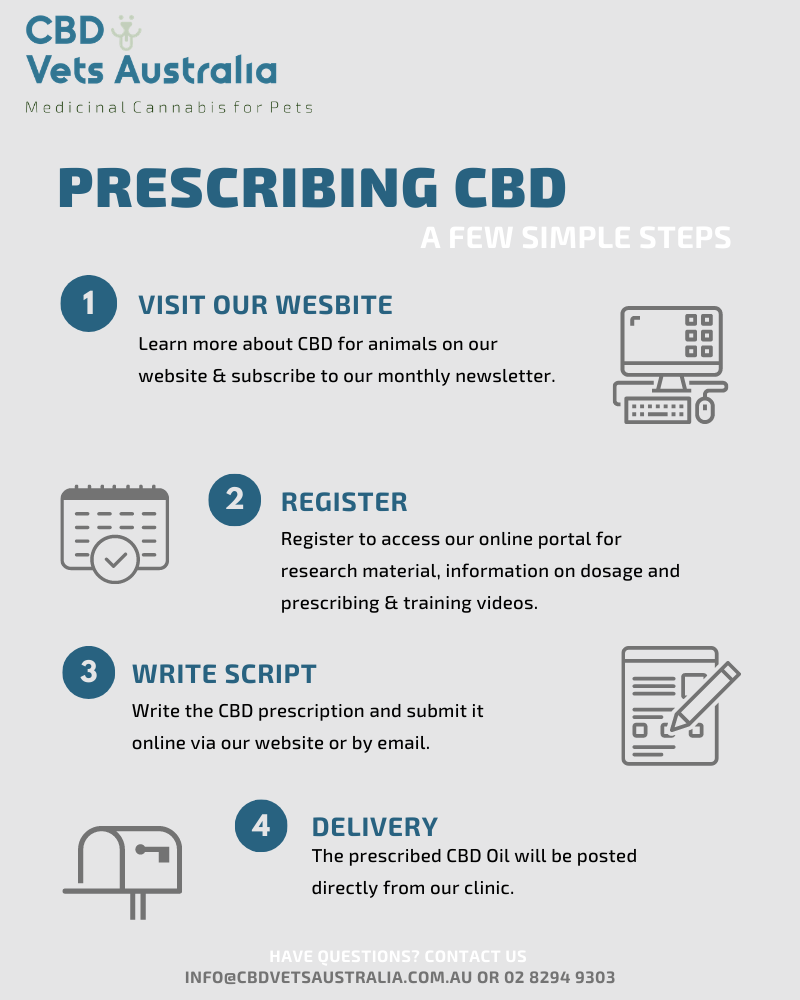Do you have animal patients who you think may benefit from CBD oil? Here is a run down on how to prescribe CBD, what health concerns it may help and the best dosage for a therapeutic effect.
WHAT IS CBD?
Cannabidiol (CBD) is a phytocannabinoid that acts on endocannabinoid receptors in the body. It can be isolated naturally from the cannabis sativa plant and it can also be made synthetically.
However, only CBD which has been obtained from the natural source is currently legally supplied in Australia.
CBD acts as an additional tool for use in animals alongside more traditional veterinary treatments.
It can be used to enhance treatment outcomes for a wide variety of conditions in animals such as epilepsy, osteoarthritis, chronic pain, anxiety, and appetite loss.
CBD, THC & HEMP – WHAT’S THE DIFFERENCE?
The other most commonly known phytocannabinoid is THC, which can have psychoactive and narcotic effects. However, unlike THC, CBD does not have any psychoactive properties and is better suited for remedial treatment.
Marijuana plants have higher concentrations of THC whereas hemp plants have higher CBD concentrations.
Hemp products – containing hemp seeds or oil – which are currently being marketed as animal health treats – do not contain high enough concentrations of CBD to produce the therapeutic effects associated with CBD.
Hemp is a good source of protein, fibre, and essential fatty acids. Proteins are essential building blocks for life that contribute to a vast range of body functions and omega fats support healthy joints, cardiac and immune function.
However, these hemp products will not have a therapeutic effect on animals.
WHICH RECEPTORS ARE ACTIVATED BY CBD?
Cannabinoid receptors are found all over the body, however, higher concentrations are found in specific areas.
CB1 receptors are found abundantly in the central nervous system and affect things like mood, cognition, pain and information, nausea, and appetite.
Whereas, CB2 receptors are found more frequently in the peripheral organs and are more involved in immune modulation.
CB1 receptors are responsible for the psychoactive properties of THC and are found in particularly high concentrations in the brains of dogs, which means that dogs are particularly sensitive to the psychoactive effects of THC.
Nonetheless, as mentioned previously, CBD is a separate compound and does not share the same psychoactive properties as THC.
IS CBD SAFE FOR ANIMALS?
There has been some initial research into the safety of CBD oil in cats and dogs. Dogs have been shown to tolerate CBD oil in relatively high doses. While some research shows CBD might affect liver enzyme status, other data suggest changes aren’t clinically significant.
Cats seem to metabolise CBD quite differently from dogs and other animals. There is currently not enough research to assess the safety or efficacy of CBD for cats.
USE & SIDE EFFECTS OF CBD
Research has shown that medicinal cannabis can be potentially used to treat conditions such as pain, anxiety, osteoarthritis and epilepsy in animals.
Any medication brings with it a chance of side effects, CBD is no different.
In safety studies and trials of dogs taking CBD oil the most common side effect observed has been diarrhea. This can usually be remedied by adjusting the dosage.
In terms of safety, CBD is considered low-risk medication.
The main side effect due to overdose is static ataxia. Other less common side effects include redness around the ears or discharge from the eyes.
For dogs, it is generally concluded that side effects from CBD are within acceptable ranges.
In cats, the most prevalent side effects displayed were head shaking and increased licking.
While side effects from CBD for pets are possible, when administered by a knowledgeable vet they can be mitigated or avoided with a careful dosing schedule.
Prescribing and dosing of CBD oil needs to be considered case by case.
It is important to learn correct dosages and any potential drug interactions.

Here are a few key things to consider when prescribing CBD.
START LOW AND GO SLOW
When it comes to the dosing of CBD products for animals, the best approach is to “start low and go slow”.
CBD is reported to have a biphasic dosing curve, which means that there is a sweet spot where the dosage is just right. If you go beyond that point, then the benefits can be lost.
Careful monitoring is required and, for more sensitive or fragile patients, it is generally advised that the dose only be raised in small increments. The only circumstances in which the dose may be accelerated are in cases where patients are experiencing a lot of pain or are facing euthanasia.
We recommend checking in weekly to see how the patient is progressing as it can take up to two weeks for CB receptors to up-regulate.
COMMON DRUG INTERACTIONS
All living things have complex physiology so care must be taken when administering a patient with multiple substances – especially when these substances are processed by the same enzyme system.
CBD is metabolised in the liver by the Cytochrome P450 enzyme system. Many other medications are also metabolised by this system.
Any medication that relies on Cytochrome P450 for metabolism can potentially be affected by CBD, resulting in increased or decreased drug levels in the body.
Some examples of medications that are metabolised by Cytochrome P450 are:
- Benzodiazepines
- Corticosteroids
- Antibiotics
- Anti-epileptics
- Antidepressants
A responsible approach to prescribing CBD in animals, if you suspect there may be a potential drug interaction, is to obtain baseline levels of ALT and ALP.
IS CBD LEGAL TO PRESCRIBE?
CBD is a Schedule 4 substance in Australia and is, for therapeutic use, defined under the Poisons Standards as comprised of 98% Cannabidiol and composed of less than 2% of any cannabinoids other than Cannabidiol.
If the CBD product meets the above criteria, a veterinarian can prescribe CBD for an animal they are treating.
If the CBD oil does not meet the criteria for Schedule 4, then it would be considered a Schedule 9 prohibited substance, and veterinarians would not be endorsed to prescribe it.
In Queensland, as in the other states in Australia, any possession of a schedule 4 medicine without a valid prescription is an offence. This is why you need to source legally prescribed CBD for your animal patients through CBD Vets Australia.
In Queensland, registered veterinary surgeons can use unregistered products within the following limitations:
– The animals must be under the care of the veterinarian.
– Veterinarians must not use, or prescribe, supply or recommend an unregistered product to treat more than one single animal of a species that is used for food or trading in fibre, bone or feathers.
– Veterinarians may only supply other veterinarians in the same surgery/clinic and only if a pharmacologically equivalent registered veterinary chemical product with instructions for use for the particular animal species being treated is not reasonably available.
LEGAL PRESCRIBING VS THE BLACK MARKET
In terms of the differences between obtaining medicinal cannabis for animals through a legal pathway and the black market, there are a number of differences to keep in mind.
From a veterinary perspective, obtaining medicinal cannabis from the black market can mean a risk to your license. There is also the aforementioned risk of reduced safety, quality, and efficacy.
When you obtain medicinal cannabis products through the legal pathway, you can be ensured that the products have undergone stringent testing and have been tested so that the quality and the safety for the animals has been assured.
Legally obtained CBD has a certificate of analysis for both the raw materials and the final product ensuring that all standards of safety, quality, and efficacy are met.
You can be confident that the composition of the product is as it says and that there is sufficient CBD in the product to have a therapeutic effect.
When you obtain products from the black market, there are no guarantees that the same testing has been done and there are no guarantees that the product will actually contain the amount of CBD that is needed for a therapeutic effect.
CBD products sourced from unknown or unregulated sources – such as the internet or black market – carry certain risks.
Some of these risks include inaccurate labelling and also the presence of contaminants such as heavy metals and pesticides.
COST & PRICE COMPARISON
You may have seen articles that suggest that medicinal cannabis obtained through legal pathways for animal health care is a lot more expensive than what is obtained on the black market.
However, on average, the price of medicinal cannabis which is obtained legally has come down to be on par with black market medicines.
Finished products have been available for some time through the SASB scheme which is available through the TGA for humans only. However, now it is possible to prescribe compounded CBD for animal health through CBD Vets Australia.

PRESCRIBING CBD – A FEW SIMPLE STEPS
CBD Vets Australia are dedicated to tailoring dosages to your animal patients’ needs and ensuring that negative drug interactions be avoided.
Have an animal patient who may benefit from CBD? Follow these simple steps to start prescribing CBD today.
- REGISTER YOUR VET: Access our online portal for research material, information on dosage, and prescribing and training videos.
- WRITE A SCRIPT. Fill out a prescription online, or send it by email, when you have an animal patient who may benefit from CBD.
- DIRECT DELIVERY: The prescribed CBD Oil will be posted directly to you or your patient from our clinic.
If you would like some more information about prescribing CBD to animals in your clinic, please feel free to get in touch at [email protected]




